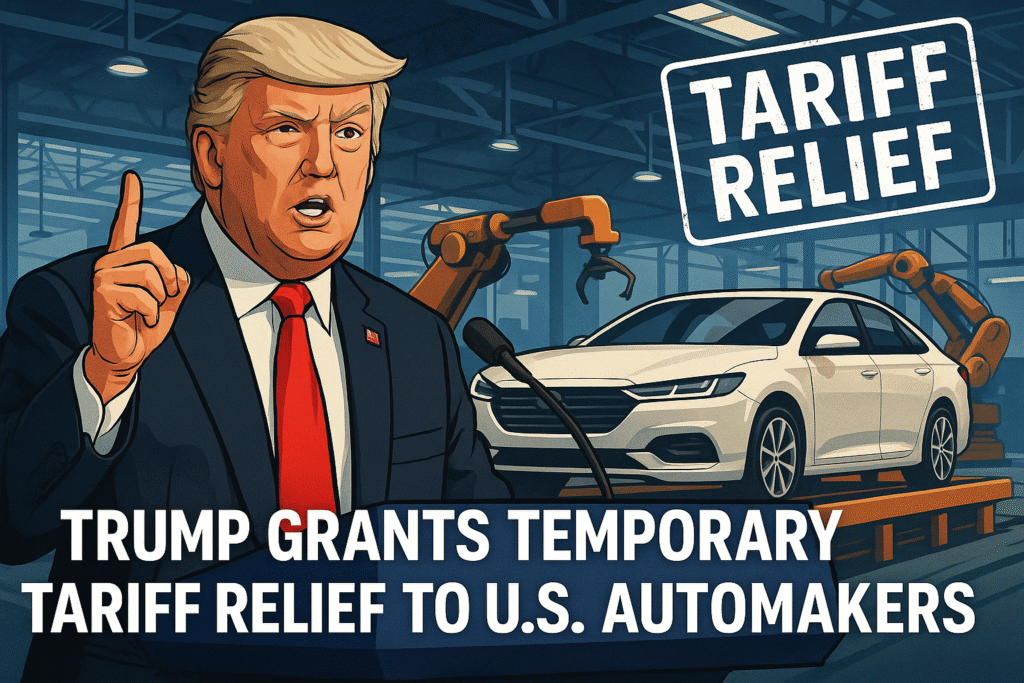Published Date: April 29, 2025 ✍️ Author: Global Trade & Auto Economy Desk 🌐 Source: GlobalWorldCitizen.com
In a major shift for U.S. industrial policy, former President Donald Trump has signed two new executive orders offering temporary tariff relief to struggling American car manufacturers. The move comes amid increasing pressure from the auto industry, which continues to battle high production costs, global supply chain disruption, and rising foreign competition.
The announcement marks a rare softening of Trump’s traditionally hardline “America First” trade policy, particularly regarding the auto sector.
 What’s New: Temporary Tariff Flexibility for U.S. Automakers
What’s New: Temporary Tariff Flexibility for U.S. Automakers
Under the new orders, the administration has adjusted existing Trump-era tariffs that imposed a 25% import duty on foreign vehicles and auto parts. Key updates include:
Exemptions from additional tariffs on related inputs like steel, aluminum, and selected parts imported from Canada and Mexico
Partial import cost relief on components used in U.S.-based vehicle assembly
Tiered exemptions:
15% MSRP tariff reduction in Year 1
10% reduction in Year 2
Full phase-out by Year 3
Manufacturers must submit cost data and import documentation to qualify.
“We gave them a little time before we slaughter them if they don’t do this,” Trump stated at a Michigan rally, doubling down on his goal to reshore U.S. vehicle production.
 Why It Matters: Carmakers Face Escalating Cost Crisis
Why It Matters: Carmakers Face Escalating Cost Crisis
U.S. automakers have long warned that the administration’s aggressive tariff policies are backfiring. The new exemptions are being viewed as a partial lifeline during a turbulent time:
General Motors (GM) revised its earnings forecast downward due to trade instability
New and used car prices continue to spike amid global parts shortages
Tariffs on parts from China, Japan, and South Korea remain in place, limiting overall relief
According to Bernstein analysts:
“Tariff relief may help in the short term, but U.S. car prices are climbing just as consumer demand is weakening.”
 GlobalWorldCitizen.com Insight: The Auto Industry and the Future of Global Trade
GlobalWorldCitizen.com Insight: The Auto Industry and the Future of Global Trade
This policy shift underscores the complex intersection of global trade, national industry strategy, and economic nationalism. For global citizens and auto investors, here are four critical takeaways:
 1. Auto Supply Chains Must Be Reengineered
1. Auto Supply Chains Must Be Reengineered
Automakers will need to localize production, diversify suppliers, and reduce reliance on tariff-vulnerable imports.
 2. Cross-Border Trade Agreements Remain Vital
2. Cross-Border Trade Agreements Remain Vital
Despite the rhetoric, trade relationships with Canada and Mexico under the USMCA remain essential for both cost management and market access.
 3. Consumers Will Feel the Price Pressures
3. Consumers Will Feel the Price Pressures
Even with exemptions, tariffs increase costs on vehicles, repairs, parts, and insurance—hitting consumers hardest.
 4. Policy Instability Adds Market Volatility
4. Policy Instability Adds Market Volatility
Frequent changes in tariff rules and trade policy continue to unsettle automakers, investors, and supply chain planners—slowing down long-term investment and innovation.
 Industry Response: Mixed Optimism and Lingering Concerns
Industry Response: Mixed Optimism and Lingering Concerns
Automakers have reacted with cautious approval:
GM CEO Mary Barra: Praised “productive conversations” and called the move a “positive step toward leveling the playing field.”
Ford CEO Jim Farley: Stated Ford will “work closely with the administration to ensure long-term industry competitiveness.”
Stellantis Chairman John Elkann: Welcomed the relief but emphasized the need for ongoing trade policy clarity.
 Final Word: Short-Term Relief, Long-Term Uncertainty
Final Word: Short-Term Relief, Long-Term Uncertainty
While the tariff relief offers short-term breathing room, it does little to address the deeper structural issues plaguing the global automotive supply chain. The future of American car manufacturing depends on whether policymakers can strike a sustainable balance between economic protectionism, supply chain resilience, and consumer affordability.
“The Trump tariffs created the crisis,” says Veronique de Rugy, senior fellow at the Mercatus Center, “and now the administration is offering partial relief. It’s a political shakedown disguised as policy.”
GlobalWorldCitizen.com Insight
At GlobalWorldCitizen.com, we’re tracking how global trade wars, AI-driven manufacturing, and supply chain realignment are reshaping the future of the auto industry. These changes impact:
Auto innovation
Investor confidence
Global supply chain strategy
Consumer access and affordability
 Stay Informed. Stay Ahead.
Stay Informed. Stay Ahead.
Explore more on:








